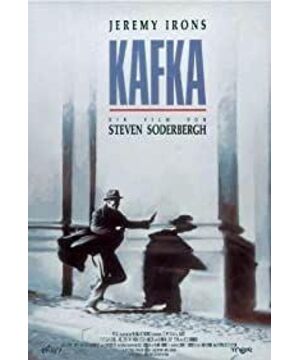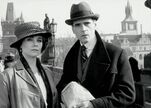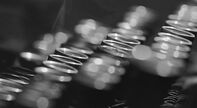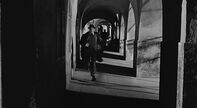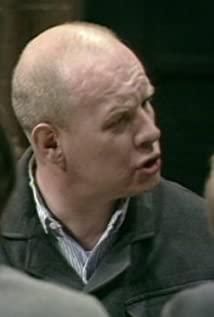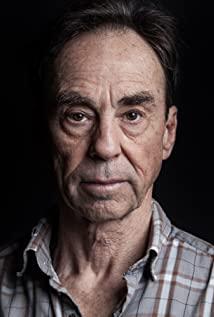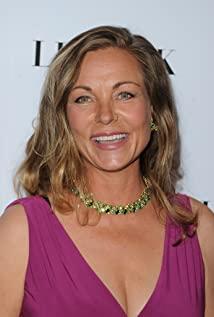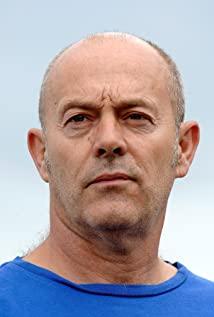To live without living, as to die without dying: writing throws us into these enigmatic sentences. --Maurice Blanchot, "The Writing of Disasters"
It is not enough to limit the reading of Soderbergh's Kafka to a political fable, as the first sociological study of the novelist Kafka saw the former as a "bureaucratic satire". "Painting" is stuck in the stage of the old criticism tradition that adheres to the principle of simulation, and it is difficult to see the anxiety and concern contained in the deeper part of the work.
Although, two-thirds of the way through the film, we see Kafka, played by Jeremy Irons, climb out of the cellar and push the door open, and the picture suddenly changes from black and white to color. Dragged into an irresistible order, and then a series of Kafka's sightings in the castle: the dissidents who mysteriously disappeared outside the castle are being subjected to some kind of violent psychotherapy (Kafka did not see them personally) , The exposed brain circuits of the subjects who have been scalped are projected on the circular glass of the ceiling through a magnifying glass to form an amazingly beautiful pattern. The experimenter of the castle (the person in power) proudly announces his spirit to Kafka The idea of control ("the public is easier to control than the individual, the public is unconscious")...this castle is too much like a "1984"-style utopia (even the black and white part mentions "double think" a few times )), dazzling the viewer, creating the illusion that Soderbergh "wasted" Kafka.
And although the novelist Kafka's "The Castle" symbolically connects the castle with the authoritarian/father (an indestructible gigantic reality, where escape and approach, destruction and repair occur simultaneously), it also vividly expresses The terrifying picture of office bureaucracy (two annoying assistants, dense desks and dossiers on desks).
However, if Soderbergh's creation is seen as a complex and sophisticated intertextual representation of Kafka rather than a simple appropriation of elements, then only the fifteen minutes of color in the film will To characterize it as a political allegory is tantamount to savagery. This airtight Gothic building towering in the center of the cemetery and its radiant zone should also be a kind of désastre neutral space in which "survival is impossible".
Shortly after the opening of the film, with a few simple close-ups of the insurance company's check-in process and a long shot of pulling back and forth with the handover movement of the characters, Kafka appears (or is "thrown in", like Gregory Ill be thrown into the morning of being transformed into a beetle), and at the same time, complemented by a Kafka narration, the contradiction is so clear: the antinomy between the mediocre day-to-day work and having to write. "Work becomes the highest form of punishment in a society where it is as highly valued as the materialist movement that empowers workers: no longer about exploitation or surplus value, but a limit".
This contradiction has been emphasized many times since, for example, the boss's heartfelt teaching to Kafka ("I understand that you are a writer"), the concept of life and the card behind the promotion and the success in the worldly sense that it represents. The contradiction between the madness and the evil of Fka's writings is already all too evident. Even when members of the anarchist organization offered an olive branch to Kafka, he still refused to write this kind of writing for newspapers, which is a kind of writing against itself, he said: "I write only for myself" , a devious writing that strips language from its power. Self-compatible writing is a peculiar way of manifesting its existence through phenomenological methods, that is, not writing is synonymous with death/disappearance/absence.
Kafka's writing is madness, but he resists another madness (the predicament of existence) by surrendering to this madness ("lucidity beyond consciousness"), yet this resistance is Sisyphus," Those who build puzzles while also working on being written down "the cataclysmic long, never-ending sentences".
When Kafka escaped from the castle, the picture returned to black and white again, as if the experience in the castle was just a suspended dream. Is that the truth? Kafka was also skeptical, and in a letter to his father began to deny the meaning of his once clinging to the truth, hoping that it would "make our lives and our deaths easier."
Kafka’s writing about castles is like Blanchot’s writing about Auschwitz. In this catastrophic space accompanied by oblivion, writing is necessary, and even silence is a kind of speech, “We rely on the loss of language—a The disaster that is imminent and unremembered—let’s speak.” In the various metaphorical descriptions of this nightmare space, he made a prophetic expression to the world, "Write, write under the temptation of the impossible truth, disaster is in this part, here, all reality, safety and sank intact."
And those madmen with abscessed faces, mysterious anarchist organizations, oppressive insurance companies, terrible totalitarian governments, whether submerged or rescued, are only stylistically assisted in this kind of absurdity. The performance of the dilemma of and catastrophe should not be the subject of the film and should not be relegated.
Let us look again at Kafka's castle: "The castle stands still as usual, its outline has begun to disappear; K has never seen a trace of life there, perhaps from that far It's impossible to see anything at all, but the eye always wants to see something, and it can't stand the silence."
Beneath that dimly lit celestial body after the stars have fallen apart, "the dominion is suspended, absent, always there, endlessly cast into the law of death, in the fall itself, as the lawless law of death: the law of the law. Others".
At the end of the film, Kafka looks out of the window (off-camera) after writing (in fact, always in an unfinished state) a letter to his father, Jeremy Irons' melancholy staring at the void and nothingness at this time is extremely Like Kafka himself, "do not read, do not write, do not speak" is not silence, but a silent speech that opens up such an unfortunate and unknown space: "Life and death have been crossed there. ".
References: The Castle, Franz Kafka, Nineteen Eighty-Four, George Orwell, The Writing of Disasters, Maurice Blanchot, Criticism and Truth, Roland Barthes
View more about Kafka reviews


